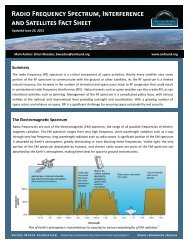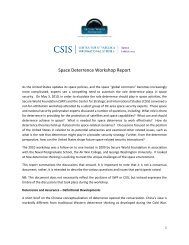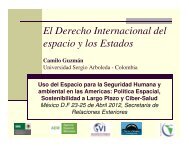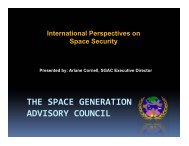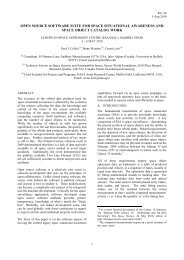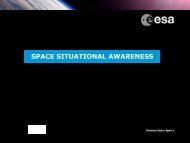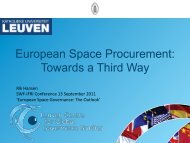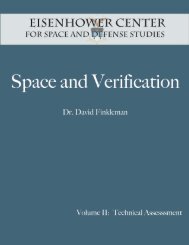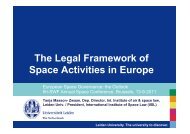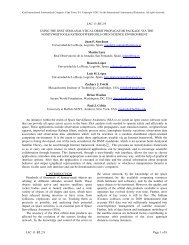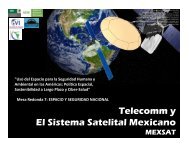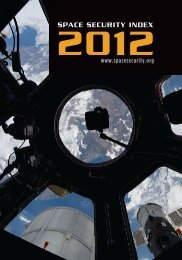Space Security Index
Space Security Index
Space Security Index
Create successful ePaper yourself
Turn your PDF publications into a flip-book with our unique Google optimized e-Paper software.
on questions and issues put before them by the GA and Member States. ere are currently<br />
69 Member States of COPUOS, which works by consensus. As well, a few intergovernmental<br />
and nongovernmental organizations have permanent observer status in COPUOS and its<br />
subcommittees. Debate on revisiting the mandate of COPUOS to include all issues aecting<br />
the peaceful uses of outer space — namely those pertaining to militarization — has not<br />
reached consensus. e U.S., in particular, has maintained that COPUOS should exclusively<br />
address issues related to peaceful uses of outer space. 85<br />
e CD is the primary multilateral disarmament negotiating forum. First established in 1962<br />
as the Eighteen Nation Disarmament Committee, it went through several name changes as<br />
its membership grew, receiving its present name in 1979. e CD, with 65 current Member<br />
States plus observers, works by consensus under the chair of a rotating Presidency. e<br />
CD has repeatedly attempted to address the issue of the weaponization of space, driven by<br />
perceived gaps in the OST, such as its lack of verication or enforcement provisions and its<br />
failure to expressly prohibit conventional weapons in outer space or ground-based ASATs.<br />
In 1982, the Mongolian People’s Republic put forward a proposal to create a committee to<br />
negotiate a treaty to address these shortcomings. 86 After three years of deliberation, the CD<br />
Committee on PAROS was created and given a mandate “to examine, as a rst step… the<br />
prevention of an arms race in outer space.” 87 From 1985 to 1994, the PAROS committee<br />
met, despite wide disparity among the views of key states, and in that time made several<br />
recommendations for space-related condence-building measures. 88<br />
Eorts to extend the PAROS committee mandate faltered in 1995 over an agenda dispute<br />
that linked PAROS with other items discussed at the CD — in particular, a Fissile Material<br />
Cut-o Treaty (FMCT). CD agenda negotiations were stalled between 1996 and 2009, a<br />
period during which the CD remained without a formal program of work. In 2000, then CD<br />
President Ambassador Amorim of Brazil unsuccessfully attempted to break the deadlock by<br />
proposing the creation of four subcommittees, two of which would deal with, respectively,<br />
PAROS and an FMCT. Similarly, in 2004, several states called for the establishment of a<br />
CD expert group to discuss the broader technical questions surrounding space weapons, but<br />
there was still no consensus on a program of work. Finally, in May 2009, the CD adopted<br />
its rst program of work in over a decade, as discussed below. However, this development<br />
was short-lived as the CD reverted to a deadlock following objections from Pakistan over<br />
FMCT discussions. To date, there is still no consensus on negotiation of a PAROS treaty.<br />
2010 Development<br />
The CD could not agree on a Program of Work, reverting to its pre-2009 deadlock<br />
e CD, which operates through consensus, agreed on a Program of Work in May 2009.<br />
Despite initial optimism that this agreement would end the longstanding deadlock, the CD<br />
failed to adopt a framework to implement the Program of Work by the end of 2009; this was<br />
mainly a result of Pakistani opposition to negotiations on a Fissile Material Cut-o Treaty<br />
(FMCT). 89 In 2010, the CD reverted to its pre-2009 position and once again was unable<br />
to adopt a program of work for its session. At its rst session on 19 January 2010, Pakistan<br />
again opposed the proposed agenda, calling for it to cover more issues. 90 By March 2010,<br />
a draft program was tabled and debated. Consultations during the second part of the CD<br />
produced a draft agenda, which Pakistan again rejected, seeing it as undermining Pakistan’s<br />
security interests. 91<br />
According to an inventory complied by the Nuclear reat Initiative, “the principal problems<br />
[of the CD] included diculties in the current relations between key players, disagreements<br />
Laws, Policies, and Doctrines<br />
67



